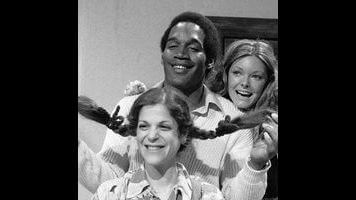Saturday Night Live (Classic): "Jill Clayburgh/Eddie Money"

Jill Clayburgh is one of those quirky only-in-the-seventies movie stars. She’s not particularly attractive, let alone sexy in the atomic fashion we now angrily demand of our movie stars (like Paul Giamatti) and she doesn’t exactly radiate charisma. Yet she was a major star of the seventies all the same, appearing in hits like Silver Streak, An Unmarried Woman and Semi-Tough, where Burt Reynolds and Kris Kristofferson battled for her affection.
The Academy Award nominee was not your typical Saturday Night Live host in that she was an actress, not a chuckle merchant, was a broad in the He Man Woman Hater’s Club that was early SNL and gave off an unmistakably adult vibe in a show made by, for and about eternal adolescents. It’s hard to imagine Clayburgh smoking a doobie with Aykroyd and Belushi, let alone toking Texas tea with Morris or sharing a reefer stick with Laraine Newman.
Unsurprisingly, Clayburgh makes for a strange fit with the rambunctious Not Ready For Prime Time Players. She and Jane Curtin more or less cancel each other out and in a Coneheads sketch Clayburgh distractingly and disconcertingly plays Aykroyd’s mistress as a variation of Laraine Newman’s signature character: a ditsy Valley Girl space cadet. I can just imagine Newman seething backstage, punching her open palm in the universal sign of anger and barely suppressed violence.
It’s no secret that Saturday Night Live has historically had a hard time writing for dames and African-Americans. In Clayburgh’s dire opening monologue the writers clearly aren’t even trying. The actress nervously bounds onstage and announces that she felt bad that her monologue wasn’t funnier the first time she’d hosted so she vowed to really kill with her opening spiel the second time around. But here’s the non-hilarious part; she couldn’t think of anything funny to do! Neither could the writers, who let her die onstage in slow-motion. Seriously, I don’t think there was a single joke in her monologue.
Clayburgh next pops up in an “Olympia Café” sketch that stretches a very thin premise beyond its breaking point. It’s followed by yet another returning character, in this case connoisseur of suckitude Leonard Pinth Garnell (he’s like a proto-me) who favors us with “Bad One-Man Theater”, a monologueapalooza where America’s best loved one-man show proprietors all perform their acts simultaneously. The bit is worthwhile if only for the sight of Bill Murray as Edgar Allen Poe. The resemblance is uncanny.
The episode mainly sticks to the tried and true, bringing back tons of recurring characters and spoofing prominent celebrities/pop culture phenomena of the time like Sybil. The legendary TV movie gets zinged in a sketch where analrapist Clayburgh is convinced that three separate women each named Sybil are in fact one woman with multiple personality disorder.
The Coneheads return in a sketch where their marriage is threatened by Aykroyd’s infidelity. The juxtaposition of heavy-breathing marital melodrama and emotionless quasi-pod people proves mightily amusing, primarily because of Aykroyd and Curtin’s deadpan underplaying, though I also liked Bill Murray as their daughter’s jerky boyfriend.
Actually this was a pretty great Bill Murray episode. He reprised his smarmy shower microphone-talk-show host Richard Herkiman and played Tony Orlando in “Celebrity Crack-Up”, a sketch devoted to cruelly mocking celebrities wrestling with mental illness. Here’s a clip:
I love the way Murray’s Orlando is personally traumatized by the passing of everyone in the business, from Charlie Chaplin on down to John Davidson’s arranger. The sketch captures the narcissism that sometimes powers grief over famous people, the way we sometimes like to pretend that disasters that affect the entire world are our own private tragedies. I remember visiting friends in New York once and one of them complain that a colleague was trying to “hog” all the 9/11 grief, that he was acting as if the terrorists had flown a plane into his fragile heart.
